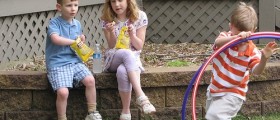
Introduction to acid reflux in toddlers
Just like the millions of adults around that are affected by acid reflux, children, even toddlers and infants, can have this problem as well.
Acid reflux occurs the same in everyone, whether they are children or adults. When people have acid reflux, they cannot keep the stomach contents in their stomach, instead, it goes back up to the throat, which in toddlers results in constant vomiting, especially, during and after meals.
This condition causes great amounts of irritation and discomfort for children and is very challenging for parents as well.
The biggest problem when this occurs in toddlers is that they cannot express themselves yet and tell the parent what is bothering them.
This is why it is very important for parents to look closely for symptoms of acid reflux and pay special attention to any problems that the toddler may be having during or after feeding.
Symptoms
As stated previously, the symptoms of acid reflux in toddlers will be most noticeable during or after feeding time.
When a child has acid reflux, it is common that they will vomit either during or after feeding. Because of this, a child may also refuse to eat or try to avoid feeding times, which is yet another sign of a problem.
The toddler will also be very irritable and cry very often if it has acid reflux. Acid reflux is very uncomfortable for adults and it is just as uncomfortable for children, especially because they cannot tell anyone about it. They can also experience heartburn, just like adults.
The symptoms also tend to be more intense at night. When a child is put to bed they will probably cough a lot and there could be a change in the voice of the child, making it more hoarse.
Another common symptom of acid reflux in toddlers is congestion and wheezing. They might also develop, as a result, congestions and infections of the ears, lungs and sinuses. Treatment
It is best to take a toddler to the doctor, and if the acid reflux is serious, then medication will be provided. The medication given to these children usually consists of acid blockers, which will decrease the amount of acid that is being produced in the stomach, which is traveling up the esophagus and causing damage to the throat area.
In many cases, the child might simply outgrow the condition, since it’s digestive system might not be developed fully yet, especially the esophageal sphincter, which is the muscle that is responsible for keeping the food and acid from coming up into the esophagus from the stomach.
In order to avoid acid reflux, it is important to make sure that the child eats while sitting upright and that it remains in an upright position at least a half hour after feeding.
It would also be wise to elevate the head of the child while they are sleeping as well.



_f_280x120.jpg)













Your thoughts on this
Loading...